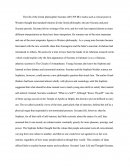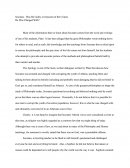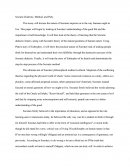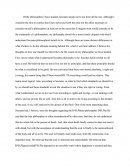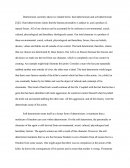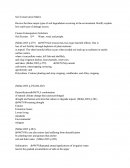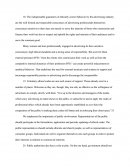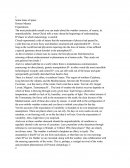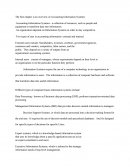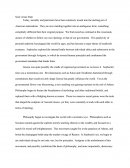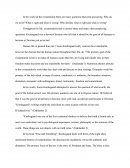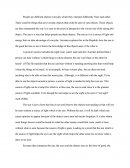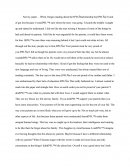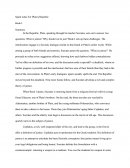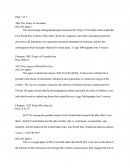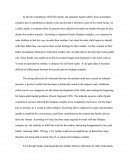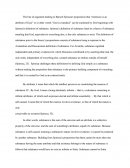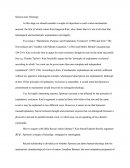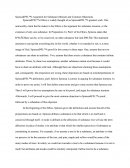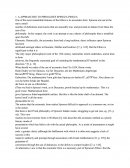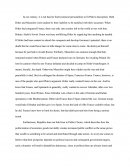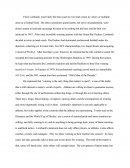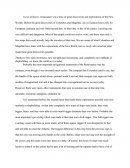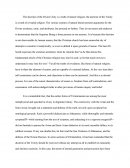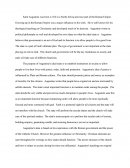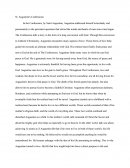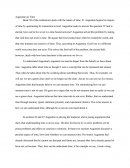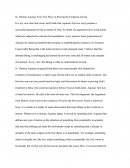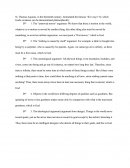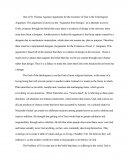Philosophy Essays
2,801 Philosophy Free Papers: 2,161 - 2,190
-
Socrates: The Greek Philosopher
The life of the Greek philosopher Socrates (469-399 BC) marks such a critical point in Western thought that standard histories divide Greek philosophy into pre-Socratic and post-Socratic periods. Socrates left no writings of his own, and his work has inspired almost as many different interpretations as there have been interpreters.
Rating:Essay Length: 493 Words / 2 Pages -
Socrates: Was He Guilty or Innocent of the Crimes
Socrates: Was He Guilty or Innocent of the Crimes He Was Charged With? Most of the information that we learn about Socrates comes from the work and writings of one of his students, Plato. It has been alleged that the great Philosopher wrote nothing down for others to read, and
Rating:Essay Length: 2,127 Words / 9 Pages -
Socratic Dialectic, Method and Piety
Socratic Dialectic, Method, and Piety This essay will discuss the nature of Socrates inquiries in to the way humans ought to live. This paper will begin by looking at Socrates' understanding of the good life and the importance of self-knowledge. It will then look at the theory of learning that
Rating:Essay Length: 1,176 Words / 5 Pages -
Socratic Worldview
Of the philosophers I have studied, Socrates stands out to me from all the rest. Although I would be the first to confess that I have never put forth the time nor the effort necessary to consider myself a philosopher (at least not in the sense that I imagine most
Rating:Essay Length: 1,565 Words / 7 Pages -
Soft Determinism
Determinism currently takes two related forms: hard determinism and soft determinism [1][1]. Hard determinism claims that the human personality is subject to, and a product of, natural forces. All of our choices can be accounted for by reference to environmental, social, cultural, physiological and hereditary (biological) causes. Our total character
Rating:Essay Length: 1,903 Words / 8 Pages -
Soil Conservation Matrix
Soil Conservation Matrix Review the three major types of soil degradation occurring in the environment. Briefly explain how each type of damage occurs. Causes Consequences Solutions Soil Erosion Ð'* Water, wind, and people. (Miller,2005 p.279) ●Soil erosion has two major harmful effects. One is loss of soil fertility through depletion
Rating:Essay Length: 465 Words / 2 Pages -
Some Steps to Take
18. The indispensable guarantors of ethically correct behavior by the advertising industry are the well formed and responsible consciences of advertising professionals themselves: consciences sensitive to their duty not merely to serve the interests of those who commission and finance their work but also to respect and uphold the rights
Rating:Essay Length: 546 Words / 3 Pages -
Some Times of Space
1 Some times of space Doreen Massey Expectations The most predictable remark you can make about the weather concerns, of course, its unpredictability. James Gleick tells a story about the beginnings of understanding Ð''chaos' in which meteorology is central: Clouds represented a side of nature that the mainstream of physics
Rating:Essay Length: 3,096 Words / 13 Pages -
Something
The first chapter is an overview of Accounting Information Systems. .Accounting Information Systems - a collection of resources, such as people and equipment to transform data into information. .An organization depends on Information Systems in order to stay competitive. .Two types of user in accounting information: external and internal. External
Rating:Essay Length: 3,544 Words / 15 Pages -
Sophocles
Soul versus State Today, morality and patriotism have been carelessly tossed into the melting pot of American nationalism. They are now melding together into an ambiguous form, something completely different then their original purpose. We find ourselves confused at the crossroads, unsure of whether to follow our own ideology or
Rating:Essay Length: 1,352 Words / 6 Pages -
Soren Kierkegaard
In the world of the existentialist there are many questions that need answering. Why do we exist? What is right and what is wrong? Who decides what is right and what is wrong? Throughout his life, existentialist,tried to answer these and many other perplexing questions. Kierkegaard was a devout Christian
Rating:Essay Length: 1,411 Words / 6 Pages -
Source of All the Things Seen in the World
People see different objects everyday which they interpret differently from each other. These could be things that are everyday objects that could be seen or rare objects. These objects are then interpreted the way it is seen or the point of perspective the viewer has while seeing this object. The
Rating:Essay Length: 616 Words / 3 Pages -
Sources
Not my paper.... When I began reading about the “scholarship boy” I kind of got lost because I wasn’t sure where the story was going. Towards the middle I caught up and started to understand. I did not like the man writing it because of some of the things he
Rating:Essay Length: 421 Words / 2 Pages -
Sparks Notes for Plato's Republic
Spark notes For Plato's Republic Book I Summary In the Republic, Plato, speaking through his teacher Socrates, sets out to answer two questions. What is justice? Why should we be just? Book I sets up these challenges. The interlocutors engage in a Socratic dialogue similar to that found in Plato's
Rating:Essay Length: 10,825 Words / 44 Pages -
Special Ed
Page 1 of 3 3803 The Treaty of Versailles. (buy this paper) This eleven-page undergraduate paper discusses the Treaty of Versailles which ended the First World War in terms of the Allies' desire for vengeance, the treaty's punishing territorial provisions, the unrealistic war reparations payments demanded of Germany, and the
Rating:Essay Length: 609 Words / 3 Pages -
Spider and the Oedipus Complex
In David Cronenberg's 2002 film Spider, the character Spider suffers from an Oedipus complex that is manifested so deeply in his psyche that it becomes a part of his whole being. As a child, Spider is sickened when his parents show affection towards one another because he also desires his
Rating:Essay Length: 587 Words / 3 Pages -
Spinoza
The line of argument leading to Baruch Spinoza's proposition that "extension is an attribute of God," or in other words "God is extended," can be explained by first beginning with Spinoza's definition of substance. Spinoza's definition of substance leads to a theory of substance entailing that God, equivalent to everything
Rating:Essay Length: 733 Words / 3 Pages -
Spinoza and Teleology
Spinoza and Teleology At this stage we should consider a couple of objections to such a teleo-mechanistic account, the first of which comes from Jaegwon Kim, who claims that it is not at all clear that teleological and mechanistic explanations can happily. Two essays: "Mechanism, Purpose, and Explanatory Exclusion" (1989)
Rating:Essay Length: 4,889 Words / 20 Pages -
Spinoza's Argument for Substance Monism and Common Objections
Spinoza’s Argument for Substance Monism and Common Objections Spinoza’s Ethics is widely thought of as Spinoza’s greatest work. One noteworthy claim that he makes in his Ethics is his argument for substance monism, or the existence of only one substance. In Proposition 14, Part I of his Ethics, Spinoza states
Rating:Essay Length: 1,512 Words / 7 Pages -
Spinoza's Ethics
1. A APPROACHES TO PPROACHES SPINOZA PINOZA One of the most remarkable features of the Ethics is its axiomatic form. Spinoza sets out at the start a small number of definitions and axioms that are assuredly true, and proceeds to deduce from these the rest of his philosophy. In this
Rating:Essay Length: 4,715 Words / 19 Pages -
Spoils of Plato's Argument
In our century, it is not hard to find tyrannical personalities to fit Plato's description. Both Hitler and Mussolini were undone by their inability to be satisfied with their successes. When Hitler had conquered France, there was only one country left in the world at war with him, Britain. Stalin's
Rating:Essay Length: 426 Words / 2 Pages -
Sports Ethics
Vince Lombardi, most likely the best coach to ever lead a team to victory or multiple ones on a football field. His ethics sometimes questionable, but never misunderstood, were always meant to lead and encourage his team to be nothing but the best, and the best was achieved in 1967.
Rating:Essay Length: 2,771 Words / 12 Pages -
St. Augustine
As we all know, renaissance was a time of great discoveries and explorations of the New Worlds. Before the great discoveries of Columbus and Magellan, our civilization knew only for European continent and very little beyond that. At that time, in the 14-th century, traveling was very difficult and dangerous.
Rating:Essay Length: 372 Words / 2 Pages -
St. Augustine of Hippo
The doctrine of the Divine Unity is a truth of natural religion; the doctrine of the Trinity is a truth of revealed religion. The various systems of natural theism present arguments for the Divine existence, unity, and attributes, but proceed no further. They do not assert and endeavor to demonstrate
Rating:Essay Length: 5,531 Words / 23 Pages -
St. Augustine Political Philosophy
Saint Augustine was born is 354 in a North Africa province part of the Roman Empire. Growing up in the Roman Empire was a major influence on his work. He is well known for his theological teaching on Christianity and developed much of its doctrine. Augustine wrote on political philosophy
Rating:Essay Length: 1,013 Words / 5 Pages -
St. Augustine's Confessions
St. Augustine's Confessions In the Confessions, by Saint Augustine, Augustine addressed himself articulately and passionately to the persistent questions that stirred the minds and hearts of men since time began. The Confessions tells a story in the form of a long conversion with God. Through this conversion to Catholic Christianity,
Rating:Essay Length: 5,036 Words / 21 Pages -
St. Augustine's Theroy ontime
Augustine on Time Book XI of the confessions deals with the nature of time. St. Augustine begins his inquiry of time by questioning its connection to God. Augustine seeks to answer the question: If God is eternal, how can he live exist in a time bound universe? Augustine solved this
Rating:Essay Length: 1,975 Words / 8 Pages -
St. Thomas Aquinas
St. Thomas Aquinas' First Two Ways in Proving the Existence of God It is my view that God exists, and I think that Aquinas' first two ways presents a successful argument for the existence of God. No doubt, the arguments have weak points which are subjected to criticism but nonetheless,
Rating:Essay Length: 5,060 Words / 21 Pages -
St. Thomas Aquinas
St. Thomas Aquinas, in the thirteenth century, formulated the famous "five ways" by which God's existence can be demonstrated philosophically: Ð'* 1. The "unmoved mover" argument. We know that there is motion in the world; whatever is in motion is moved by another thing; this other thing also must be
Rating:Essay Length: 273 Words / 2 Pages -
St. Thomas Aquinas, Nietzche
One of St. Thomas Aquinas' arguments for the existence of God is the Teleological Argument. This argument is known as the "Argument from Design," as it attempts to prove God's existence through the belief that since there is evidence of design in the universe, there must have been a designer.
Rating:Essay Length: 1,170 Words / 5 Pages
